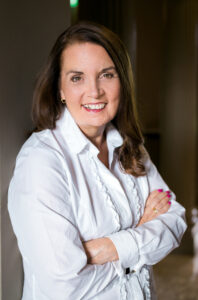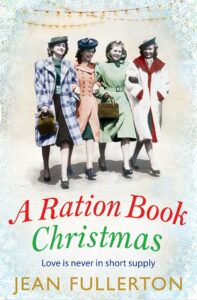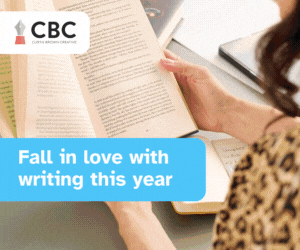Jean Fullerton: Romance Is A Feminist Issue.
12 October 2018
Today I am delighted to welcome our RNA Chapter Co-ordinator, Jean Fullerton, to the blog. Jean’s latest book, A Ration Book Christmas, was released yesterday and as a veteran novelist of historical romance, I understand the talk you gave recently to the York Tea made a few interesting points about how Romance is a Feminism Issue.

Thank you, Lisa, thanks for inviting me onto the blog.
I was recently at a party enjoying myself with good food and chatting to people. I was just getting to know one woman when the Hero@Home came over to join us. As the conversation progressed shameless fan, that he is, the Hero@Home managed to work in to the conversation that I was an author
‘Oh,’ said, the woman. ‘I’m reading a marvellous book at my book club the moment called XXXX. It had rave reviews in the Sunday Time and Guardian and is a hot favourite for next year’s Costa. It’s about two sisters in 19thcentury China in working in their family’s paddy-field after their parents have died, after contracting measles from a missionary. It’s an allegorical tale where one sister represents the tradition of ancient China while the other represents the encroaching western civilisation. Their struggle in the field is a metaphor for the clash between the two cultures. It’s been translated from the original Mandarin so it’s a bit heavy going but I’m determined to get to the end.’
Then she looked at me and smiled. ‘So what do you write?’
Now, don’t judge me but at this point I’m ashamed to say that I fell back on the easier option by saying I write historical fiction and produced a card with my book cover on.
But why is that?
Why did I, loud and upfront that I am, hesitate when asked the question? Why didn’t I say proudly ‘I write Romance?’
And admit it. I’m not the only one who’s fudged that question and mumbling on about popular fiction, women’s fiction or something else?
Why can we not just say ‘I write Romance?’ and have done with it? Well perhaps I can unpack a few reasons why we struggle sometimes to be loud and proud Romantic Novelists.
The first is good old-fashioned snobbery.
Romance is universally looked down upon by the main stream literary establishment as sub-standard and pulp fiction of no worth, and worst of all, it’s popular.
For goodness sake. If the bloody hoy-poi can read and enjoy a book, then how are you going to off your intellectual status and sensibilities?
Popular they might be, I hear the critics cry, but they are here today and gone tomorrow. Not like the classics.
As I say, pulp fiction!
Well, firstly, like many of the RNA members, Austen wasn’t writing a literary classic she was writing a contemporary romance and although I don’t think any of my books will make it onto a future GCSE reading list, Me and Dickens do have something in common; we write for people to enjoy, not to impress the critics.
Romances are double damned because not only are they hugely popular, but when literary writes are moaning about being forced to live in a cardboard box in middle of ‘t road, the most popular romance authors are doing very nicely, thank you.
They make money.
Of course, there’s a simple reason for this. It’s not rocket science. People love them and therefore they sell shedloads.
Romance is a most lucrative genre, but despite this I feel the publishing industry subtly feeds into this undervaluing of Romance too, and this is reflected in marketing and publicity budgets.
It’s a bit of a collective Emperor’s new clothes syndrome but also, I don’t suppose being the editor of a best-selling popular saga or chic-lit author plays as well to an editor’s peers or adds to their reputation in the same way a Costa winner does.
The other reason why we don’t readily reply ‘I write romance’ is because I don’t think we do.
Just write romance, that is. We write much, much more.
While it’s true our heroines in any setting and time period search for the love of their life, they often do this whilst struggling with a messy divorce, raising a child alone or striving to establish themselves in a career. They often have wider family issues or things in their past, like abuse or bereavement, they have to come to terms with and lay to rest. Our heroes, too, aren’t square-chinned supermen either but often have a tortured past or broken relationship that they have to grapple with.
None of it is romantic in the conventional hearts and flowers way. It is the internal struggles and tension of everyday lives, so familiar to our readers, that makes our genre in all its forms so hugely popular.
Of course, you only have to look at any recent article in the mainstream press on the subject with their well-worn references to ‘bodice rippers’ and ‘alpha males’ to know those who are so quick to condemn, and ridicule romantic fiction haven’t actually read any for decades.
They rework the ‘It’s just fantasy, escapism and gives women an unrealistic expectation of men,’ angle which belittles women who read and enjoy our books.
Well, firstly to quote our beloved chairwoman Nicola Cornick, when it comes to realism in fiction more people have fallen in love than exposed a Russian spy network or been sent to a space station, so who’s fantasising?
And if Mr Darcy or Ross Poldark has given women unrealistic expectations of men then I suggest men start to up their game.
We romantic novelists are used to that sort of laughable comment.
However, something which is not at all funny, but patronising and insulting is dismissing romantic novels as being of no importance because they are written by women for women.
This implies that women’s experiences are somehow of less value and of less worth than novels which focus on men and their lives.
As romantic writers we should reject this premise vigorously. With a few exceptions, until the middle of the last century, women’s hopes, and desires were seen only through male eyes, and often as two dimensional and stereotypical figures. The loving mother, the heartless tart, innocent victim and too often as sexual objects; all there to service male desires and needs.
The women in novels reacted to, rather than acted, to situations and their happiness or otherwise, rested solely on what others did.
Women writing romantic fiction in the latter half of the last century changed that. Catherine Cookson was the trail blazer of my own genre her stories focused on the grinding poverty and heart-breaking lives of working class women who triumphed over adversity.
They were, and still are, affirming and honouring generations of ordinary women
I remember, too, the first wave of American romantic fiction, from the likes of Katherine Woodiwiss, the Jackie Collins novels and the translated Angelique series which explicitly dealt with women’s sexuality and portrayed them as actively wanting sex rather than being just an object of desire.
Now it’s easy to look back on the romantic novels of the 60s and 70s and condemn them for reinforcing the submissive view of women. They were of their time and, like all historical events, have to be judged in the context of the social norms of their period.
However, like everything else Romantic novels have evolved and today we have a great variety of the genre from suspense, contemporary, historical and my own saga, all with their particular voice and insight into women’s hopes and dreams.
But against the tide of disdain and contempt we romantic novelists are fighting back. In the vanguard, as anyone who attended the panel Nicola Cornick, Andrea Penrose, Mary Jo Putney and Patricia Rice at this year’s RNA conference, will know, are our sisters from the other side of the pond.
They are arguing that romantic fiction is a feminist issue and reject those who say that romantic fiction perpetuates abuse and subjugation of women. They have argued strenuously about the value of romantic novels within the feminist narrative.
There are now university courses on how to write romance in the 21stcentury and there is even an online academic periodical, The Journal for Popular Romance Studies, which publishes research into romantic fiction.
However, I don’t want you to think I don’t acknowledge that men write romance. They do and write it well, but it is often marketed as another genre, such as a war novel like William Ryan’s Constant Soldier, or Sebastian Faulks’ Birdsong.
Despite its lack of kudos romance creeps into in other genres such as crime, where there is often sexual tension between the suspect and investigator.
You can’t escape romance.
One of the best TV programmes a few years ago was an Australian sci-fi series on series called Farscape. Now while the story was about other worlds and conflict between species, the story line that had people glued to their sets was the romance between John Crichton and Aeryn Sun, an alien.
So sorry literary critiques and pompous, literary authors you can look down on us from your lofty intellectual pillars if you like but romance, and those of us who write, it are here to stay:
You can tell us a happy ever afteris unrealistic, that things don’t always work out right in the end, and a that a quick look at the headlines will prove that good doesn’t always overcome evil.
And we couldn’t argue.
But we, as romantic writers of all genres, still hold out the hope that despite the odds, and against overwhelming adversity sometimes, just sometimes, love does win and dreams do come true.
Thank you, Jean, for a most powerful and uplifting read; you are completely right. I do tell people I write romance but the it does meet with dismissal form some. And yet, romance doesn’t quite encompass all those gritty issues you have just mentioned which women struggle to overcome, which once overcome can lead to a HEA.
And onto your latest release, A Ration Book Christmas.

In the darkest days of the Blitz, Christmas is more important than ever.
With Christmas approaching, the Brogan family of London’s East End are braving the horrors of the Blitz. With the men away fighting for King and Country and the ever-present dangers of the German Luftwaffe’s nightly reign of death and destruction, the family must do all they can to keep a stiff upper lip.
For Jo, the youngest of the Brogan sisters, the perils of war also offer a new-found freedom. Jo falls in love with Tommy, a man known for his dangerous reputation as much as his charm. But as the falling bombs devastate their neighbourhood and rationing begins to bite, will the Brogans manage to pull together a traditional family Christmas? And will Jo find the love and security she seeks in a time of such grave peril?
What made you decide to set this particular novel at Christmas and how easy was it to research wartime Christmases in East End London?
It was quite difficult as 1940 was a grim Christmas, especially in the East End of London as they’d lived through 4 months of nightly bombing during the Blitz. Everything was in short supply except Christmas spirit as the wonderfully, heart-warming memories of people who lived through that dark time can testify. I used people’s biographies on the BBC history site along with people, now in their eighties who remember war-time Christmases as a child. I also dug deep into the stories my parents along with aunts and uncles told me. There are a couple of research books, War Time Christmas 1939-1945 and Christmas on the Home Front, by Mike Brown, which look specifically at war-time Christmas plus recipe books which helped me highlight the problems Jo’s mum, Ida, had trying to provide a good spread for her family.
This is your 12thnovel, many congratulations. I would love to know how you got into writing historical romance and what makes you focus on East End London.
I famously started writing after attending an NHS stress management course when I was a District Nurse manager in the NHS. It recommended we take up a hobby to relieve stress. I’d been a lifelong historical reader, so thought I might take a stab at writing an historical novel. It was just for a bit of fun: nothing serious. It was only when stories, plots and characters started to materialise in my mind that I realised my writing gene had unlocked.
It’s a bit difficult to explain the affinity I have with the place where I was born. The Fullertons arrived in East London in the 1800s while the ‘O Rileys were later, when the potato famine triggered a wave of migration from Ireland. During WW2 family all either lived through the London Blitz or fought adding to the area’s legendary for their Blitz spirit. Thanks to popularity of music halls, cinema, war-time radio and early TV, the cockney culture is an integral part of London’s identity. Therefore, when I started imagining stories it seemed natural to set them in the area I love so much. Someone once said to me that I was lucky to be able to draw on such a rich heritage, and they were right.
Finally, I specifically put a call out to historical romance authors because I really wanted our readers, who write HR, to be represented on the blog. Therefore, could you please give me your three top tips for writing in this genre.
Forget the history.
Tip 1: You’re writing a love story about two people and that’s what’s important whether they are in space suits or doublet and hose. Concentrate, firstly on getting their emotions right and believable. However…
Tip 2: Having said that, I’m now going to contradict myself and say getting the historical detail right is vital. Check and check again and use primary source where you can, diaries memories etc, if you can. And not just the sort of carriage your characters would have driven in or what clothes they would have worn but their speech and attitudes, too. However…
Tip 3: Although, it is true that in times past many people held views about race, colour and class which are abhorrent now. Although they can, and should be, included if the story warrants it, remember you are writing for 21stCentury readers. Never, never, let your hero and heroine express or hold views, regarding people of colour or sexual orientation that would be offensive to a modern reader.
Thank you again, Jean, for a fascinating interview into writing historical romance and how your journey to success began. I can honestly say this has been my most enjoyable interview yet!
*
Author Bio:
Jean is a Londoner who worked as a district nurse in East London for over twenty-five years and is now a full-time author. She has won multiple awards and all her books are set in her native East London. Her first series was set in the early 1800s but her most recently four books about nurses Millie and Connie have jumped forward a century and are set at the end of WW2. Her latest book, POCKETFUL OF DREAMS, is the first of her East London WW2 series featuring sisters Mattie, Jo and Cathy Brogan and their extended family.
*
 Lisa Hill writes contemporary romance with a light-hearted tone. What interests her most is people, their interactions, emotions and relationships. It’s probably why her career to date has been based in property; she confesses herself that she is ‘naturally curious’. Her first encounter with a romance author was chats over the garden wall between her father, Godfrey, and Mrs Cooper from the neighbouring village of Bisley. It came as quite a surprise in later life to find that Mrs Cooper was in fact Jilly Cooper! Lisa’s writing inspiration now comes from other Cotswolds’ authors including Jill Mansell and Katie Fforde. Lisa’s latest novel, Heart in the Right Place, is out now with Manatee Books.
Lisa Hill writes contemporary romance with a light-hearted tone. What interests her most is people, their interactions, emotions and relationships. It’s probably why her career to date has been based in property; she confesses herself that she is ‘naturally curious’. Her first encounter with a romance author was chats over the garden wall between her father, Godfrey, and Mrs Cooper from the neighbouring village of Bisley. It came as quite a surprise in later life to find that Mrs Cooper was in fact Jilly Cooper! Lisa’s writing inspiration now comes from other Cotswolds’ authors including Jill Mansell and Katie Fforde. Lisa’s latest novel, Heart in the Right Place, is out now with Manatee Books.

